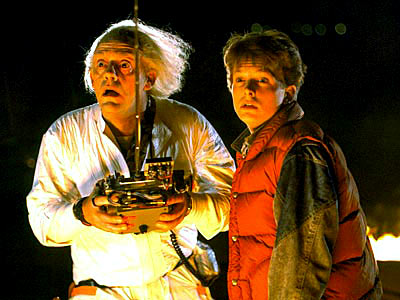
MTV Killed the Radio Star
Comment
Thanks for your passionate and humorous take on the end of Total Request Live's ten-year run on MTV--or, if the Associated Press article you cite is to be believed, the hiatus declared by the network to "give [TRL] a break after an unprecedented run." I personally doubt that TRL is ever coming back since the program's success relied as much on the personality of the VJ as its interactive elements. As you point out, it is difficult not to associate the show with the mercurial Carson Daly (see image above left), a much-maligned figure in popular culture but also an oddly reassuring presence of calm amidst a daily circus of screaming teenagers and flash-in-the-pan pop music acts. Whatever your opinion of Daly, he at least stood out from the succession of bland talking heads or eccentric fashion plates that emerged after his departure. And considering that you reference other music video countdown shows that are or have been superior to much of TRL's run, I would be interested to know your further thoughts on MTV's presumptive replacement for the show: Feedback Nation MTV, or FNMTV. By choosing a host with built-in celebrity recognition--Fall Out Boy guitarist Pete Wentz--and pairing performances from major label artists with video premieres of independent acts such as No Age and She & Him, it is clear that MTV is trying hard to re-create the buzz surrounding TRL's heyday.
I must also take umbrage with your assertion that "finding new music that actually challenges you is hard when you are all alone on the endless interweb." On the contrary, I think that such independence allows one to deliberately seek out artists and songs that exist outside the major promotional pushes of record companies and the radio industry. The development of direct-distribution sites like MySpace Music and the presence of so many well-written music blogs on the Internet have democratized the distribution of popular music. It might take a little bit of searching, but the resources similar to the ones you desire (based on your invocation of the dearly departed Muxtape) are not impossible to find.
"Do You Still Want Your MTV?"
Comment
In your reporting on the launch of MTV Music, I must say that I enjoyed your enthusiasm for the MTV of a bygone era--when it was, as you so succinctly state, "THE MOST IMPORTANT TV STATION IN OUR LIVES." With the recent cancellation of the last bastion of the music video on "Music Television," Total Request Live, it seems as if the network is willing to abandon the format. And while I can also appreciate the nostalgia that permeates the MTV Music project, it is clear that MTV has strayed about as far from its original 1981 mission--to play music videos and disseminate music news--as conceivably possible. A look at MTV's typical daily schedule and even the curiously redundant title "MTV Music" underscores this sad irony. I cannot help but think that this is worrisome for the future of music videos as a whole. There is little economic incentive to produce music videos without a broad platform for exhibition and although the Internet has picked up some of the slack from television, it is inconceivable to think that more than a few videos each year could reach the type of cultural saturation common in the 1980s and 1990s.

It is interesting that several other comments on this post have mentioned a desire to see MTV Music evolve into a full-scale cable channel as a sort of hybrid between VH1 Classic and MTV's barely-adequate once-a-week video premiere show FNMTV. I, for one, do not think a channel like this would be successful because of the pop cultural evidence that the music video is barely respected as an art form anymore. The video for Rick Astley's 1988 hit "Never Gonna Give You Up" (see image above right) is both a "Top Rated" and "Most Viewed" clip on MTV Music, undoubtedly on the strength of its popularity as an absurd online practical joke. Despite MTV's best efforts to highlight long-lost classic videos and artists obscure to MTV's target audience, how is MTV Music anything than lip service to the obsolete product that made the network rich? I also want my MTV, but I do not expect to receive it anytime soon--at least not in any form that I will embrace.




